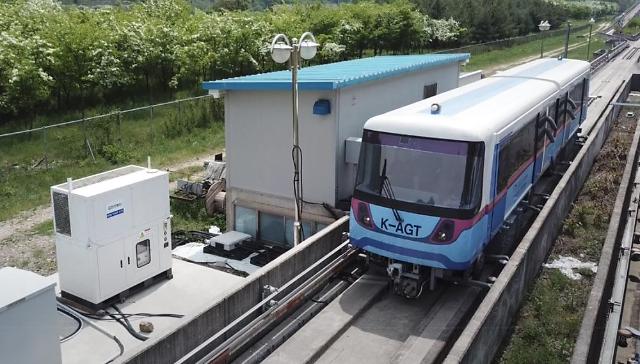
[Courtesy of the Ministry of Land, Infrastructure and Transport ]
SEOUL -- South Korea's wireless charging system for railways has attracted attention from experts who held an online meeting to establish international standards. Discussions focused on the method of coils, which are vital in a wireless charging system. South Korea has proposed an oval coil method.
The meeting on May 7 involved some 30 experts from France, Italia, Germany, China, Japan and South Korea, which are members of a TC9 ahG 29 group at the International Electrotechnical Commission (IEC), which prepares and publishes international standards for electrotechnology, according to the Ministry of Land, Infrastructure and Transport.
The IEC ad-hoc group deals with the interoperability and safety of a dynamic wireless power transfer (WPT) system for railways. "It is very meaningful in that international discussions have begun in earnest on international standards related to the interoperability and safety of the railway wireless power transfer system proposed by South Korea," the ministry said in a statement on May 10.
Cordless charging uses magnetic waves. There is no risk of electric shock, and WPT can reduce tunnel construction costs and fine dust generation. It is possible to freely select the location of stations and increase the length of routes and battery usage time, and reduce waiting time for charging.
"South Korea is expected to lead railway WPT technology and lay the foundation for preoccupation in overseas markets through the establishment of international standards," Kang Hee-up, an official at the ministry's railway safety policy bureau, was quoted as saying.
The efficiency of power transfer is closely related to primary and secondary coils, their sizes, materials as well as distance. The proper selection and positioning of transmission and receiver coils have a major influence on the efficiency of power transmission. South Korea has stepped up efforts to establish some international standards for a charging system that enables wireless power transmission while an electric vehicle is stopping or running.
Copyright ⓒ Aju Press All rights reserved.


![[FOCUS] S. Korea steps up international campaign to lead standardization of EV wireless charging](https://image.ajunews.com/content/image/2021/04/15/20210415170115831279_278_163.jpg)